- Home
- Taylor Caldwell
To Look and Pass Page 2
To Look and Pass Read online
Page 2
There were a few other families in South Kenton, also, in a sort of limbo between the despised stratum of nondescript townsfolk and farmers from the outlands and the snobbishness of our little circle. These included the constable’s family and the undertaker’s family, and the general storekeeper’s family, and they were occasionally included in our refined little parties and other doings, though never completely accepted. The richest man in town was Ed Ford; he owned the brewery outside of South Kenton and the American House in town with its hilarious bar. But he was a man of such opulent appearance, with his plaid vest, white shirtsleeves, profanity, gold watch-chain and charms, and sleek, walruslike whiskers, that he was avoided publicly, though not privately, by the better element. He was also a foreigner; that is, no one knew exactly what his origin was, and besides, he tended bar in his “hotel.” He gave lavishly to church funds, could always be counted upon for charitable donations, but he was too expansive of speech, too ready of friendly tongue and back-slapping hand, too loud and raucous of voice, to be included in our refined little orbit. His three pretty daughters were never invited anywhere except when absolutely necessary, and while I was still a child they traveled a good deal and finally married substantial gentlemen in other and larger towns. The good ladies of South Kenton were always suspicious of Ed Ford, and, led by Livy’s mother, they were eternally getting up “crusades” against his wicked bar and brewery. However, the women were never too severe and thorough about them, because Ed Ford’s generosity had to be depended upon, on not infrequent occasions, to pay Livy’s father’s salary. When Ed, with a grand gesture, actually contributed half the funds to build a new parsonage, the crusades died a sudden and discreet death. Ed was no fool.
In the limbo was also included the family of Con Sturgeon, owner of the Opera House.
To all of the youngsters of the inner circle, the families in the limbo seemed brilliantly colored, romantic, enviably high-living, pursuing lives of mystery and excitement. Beyond the limbo, we knew nothing and cared less, imitating our elders’ light scorn and head-turning. Even my father, the country doctor, kind and jovial and gruff enough when visiting farmers’ wives and children, recognized his humbler patients with only a casual nod when he met them in town. Thus for early American democracy.
Some will ask why Mundell and Crawford, the horse dealers, and Sarah Faire were included in our solid inner community. Well, Mundell and Crawford were well off, and their fathers, and their fathers’ fathers before them, had been first settlers, and of good family. Sarah Faire was not at first included, but eventually her charming manners, docility, fascinating voice, and unusual beauty endeared her even to the frosty-lipped ladies. She was very intelligent, and had the art of pleasing down to a fine point. Moreover, she was an accomplished musician for South Kenton, and could play the violin with extraordinary skill, though not, as I later discovered, with any particular inspiration. She had a select little class of pupils among us, and she handled this matter with a casualness, in conjunction with her dressmaking, which aroused admiration. She could always be called upon in an emergency, was also ready with a helping hand with her usual good nature and amiability. No one could help liking her. Perhaps that also accounts for Beatrice’s later hatred for her mother.
Sarah Faire was the only one in our society who did not possess a carriage, but she had the choice of any of our vehicles on Sundays. We called for her, and she would climb lightly into the carriage, a dainty figure in her muslins or silks or velvets, exquisitely gloved and rosy of cheek, a parasol of many silken ruffles over her nodding plumes of chic little bonnet, her small white teeth flashing in a good-tempered and agreeable smile. She would be accompanied by Beatrice, a pretty little replica of herself in black boots, embroidered petticoats, and long fair curls. Sarah would laugh and talk gaily to her hostess, but Beatrice would sit in a corner of the carriage, smirking faintly, her little gloved hands primly in her lap. All the adults petted the child excessively; her manners were perfect.
We made a leisurely and delightful party, as we all drove up to the door of the little white Baptist church, our carriage wheels twinkling, our spanking horses fat and sleek, and calling out greetings to each other. The churchyard would be flooded with warm, quiet summer sunlight; even the gravestones looked festive, green and smooth and decked with flowers. There were few amusements in those days, and our social life centered about the church, with its small glass windows and scrubbed, bare interior. Life was placid and static, yet filled with a content and richness not found nowadays in the feverish coming and going of a life that lives only on the surface. We were not tired by headlines, by alarums, by movement that at last only resolves into inertia. We were not concerned with the doings of a febrile Europe; what the Kings and the Mundells and the Crawfords and the Rugbys were doing, were going to do, was excitement enough for us. We discussed marriages of two and three years ago with an avidity that did not tire until another marriage happened. Mrs. Hughes’s new curtains furnished the ladies with conversation material for months; the Williams’s new horse was a subject that could not be exhausted. For weeks, the ladies were in a flutter about the contemplated strawberry festival in the church grounds; the annual fair consumed the attention of all the community to the exclusion of everything else. Bourgeois women were not yet concerned with Art and Movements; in fact, they knew scarcely one book from another, and an artist seemed to them a monstrosity that would never cross the placid circling of their tight little orbits. When I became a young doctor, the pride of my father, I found no neurotic women in my community, found no inhibitions or complexes or psychopathic behavior. Livy says it is because these things had as yet no names, but existed just the same, as witness so-and-so and so-and-so. But I am of the opinion that strange and twisted behavior is the result of too much thinking, too much leisure, lives that are too crowded with exigent things that are worthless in themselves. Health lies in simplicity of thought as well as simplicity of living. When men become too concerned with their souls and their mental lives, trouble sets in. The more we emulate the animals in directness of simple purpose, whether that purpose is benign or cruel or barbarous, the better our health, mentally and physically. Excessive childbirth may have been bad in some few cases, but except for women like Livy, the childless woman is a whole lot sicker in her mind and body than the woman with six or more children. It seems to me that whatever mind or soul a woman has, she’s better off if she ignores it.
Of course, we had our infrequent scandals and stupidities and cruelties. We wouldn’t have been human if we hadn’t. But even these things had a healthy lustiness about them. There was a sort of robust animalism in the way the people of South Kenton treated Dan Hendricks.
Dan and his drunken father did not go to church. The minister showed no wholehearted regard for their souls. The consensus was that they were not worth the saving. I confess that for a time I was troubled by Dan’s godlessness, and each Sunday I resolved that I would cut off our friendship. Livy never had such thoughts; she was a total heathen, for all she was the minister’s daughter. Livy has less religion and faith and more humanity than any other creature I ever saw.
I can stop now, and I can hear the little husky organ groaning in the soft hot silence of the summer Sunday; I can hear the leisurely singing of the congregation, following the music with individual interpretation. A bumblebee comes zooming through an open window, and, catching the sunlight on his yellow wings, he dips and soars over the flowered hats and bonnets of the women. Outside, through another window, I can see the quiet green fields and dusky purple hills beyond, and to the south, the white village houses in their nests of massive green. Mr. Bingham stands in the pulpit, lank and black-garmented, solemn and eyeglassed, his fingers between the leaves of the hymn-book; a sunbeam glistens on his bald head. Over everything is a shining and slumberous peace; heads nod here and there as Mr. Bingham begins to drone his long sermon. I see Livy and her mother and sisters across the aisle; Livy yawns, and mischief sparkles in
her dancing round eyes.
Then, the huge Sunday dinner afterwards in a darkened dining room; braces of brown chickens and stuffing, roasted potatoes and greens, squash and yellow yams floating in syrup, golden pies and rich jams and thick brown coffee with cream, pitchers of warm milk, glass containers full of shining spoons, a tablecloth like a white board and napkins like small sheets. Then freedom, to run through the hot fields beyond the village, to go looking for wild blackberries and blueberries and, later, for nuts. Life, after Sunday dinner, seemed endless, full of shining sunlight, distant voices, white dresses, and sleepiness.
Dull? Yes. Perhaps. But when is life really not dull? It is all a very dull business. But it becomes duller when we expect vague richnesses and movements in the near future, when man cannot resign himself merely to exist and drink up the present moment, slowly and placidly, as cattle, standing in their own images, drink up satisfying waters.
Chapter Three
Sarah Faire’s house was very popular with the children of South Kenton, even with Beatrice present. We liked to hear the whirr of her sewing machine. She was never hurried or cross. We could help ourselves to the contents of the huge cookie jar in the big, sun-filled kitchen, and then go and swing under the old trees in her front yard. Sometimes she would get out her “fiddle” for us, and play and sing sentimental songs, and then give us glasses of fresh rich milk and a slice of fruitcake or fresh, hot pie. She seemed as young as we; we liked to hear her laugh. We told her things we never told our parents. Because of her, we even played with Beatrice. She had an eternal youthfulness, joyous, laughing, generous, and gay.
We were all over there, about six of us, one warm spring afternoon after school, racing over the new green grass, shouting, dodging around the trees. The skies were blue as they are never blue now; there was a freshness to life, a newness, that never comes nowadays. Life was so young and untarnished and uncomplicated.
We trooped into the house for cookies and milk. We had smelt the cookies baking as we played; they added zest and high hysteria to our gaieties. We sat about the kitchen table with its turkey-red cloth, and stuffed our mouths with cakes succulent with raisins, and poured milk from a squat white pitcher with painted cherries on it. The early evening had turned cool, and the big black range, shining and clean, fumed with delightful warmth. We all talked as fast as we could.
Sarah stood over us, laughing, filling our plates. I can see, as if it were just yesterday, how her hair shone with reddish lights, how neat and trim her slender figure was in its dark blue dress with its white lace at the high neck. I was surfeited with content; I glanced about idly. A twelve-year-old boy is not particularly observant, but when my roving eye lit for an instant on Beatrice’s face, I went suddenly very cold. The child’s face, as she looked at her mother, was full of an elemental malevolence, still, held, yet ferocious. I can understand it now; she hated us as we hated her, and she hated her mother because she was good to us and liked us.
I looked away, uneasy. I felt that I could never come here again, and I was filled with sadness. I glanced at Livy; she was talking vehemently to Sarah. No one had seen but myself.
Someone knocked at the front door, and Sarah tripped away, humming. We paid no attention until Sarah reappeared with Dan Hendricks. Dan wore his usual galluses, was barefooted, shaggy, fumbling, and red with embarrassment. Though only thirteen years old, he stood an inch taller than Sarah.
We all stared blankly at Dan. To our knowledge, he had never been here before.
“Well, now, isn’t this nice!” exclaimed Sarah vivaciously, as she shoved, rather than led, Dan into the kitchen. “Dan here just brought me Mrs. Mundell’s red foulard, because you, Jane, you bad girl, forgot to bring it today. So now, Dan, you sit down right here, near me, between me and Livy Bingham, and help yourself to the cookies and the milk. Land, I almost forgot I’ve a fresh batch just ready in the oven!”
She ran to the stove, knelt before it, and produced from its hot depths a sheet of celestial circles. Dan did not sit down; he stood near us, not looking at us, his face very red as he wrung his hands together. A thick silence had descended on us, an uneasy and embarrassed silence. I tried not to look at Dan, coward that I was. But Livy at last held out a peremptory little hand and seized him.
“Didn’t you hear Mrs. Faire say you were to sit by me, Dan?” she shouted. She literally dragged the agonized boy to the chair beside her; he fell into it, full of misery, trying to avoid looking at us. Sarah came back to the table with a platter of hot cookies, and poured Dan a large and foaming glass of milk, and tossed several of the cookies onto a small blue plate before him. If she noticed our silence, we were not aware of it.
The joy of the afternoon was gone for us. Two or three of the girls elevated small noses as though they had smelled something offensive. Two of the boys, in their embarrassment, began to scuffle furtively. But Sarah chattered gaily to Dan, continued to heap his plate in spite of his murmurs. Livy talked to him also, with a sort of fierce vivacity.
“I think,” said Amelia Burnett in her high thin voice, “I’d best be going home. Ma’ll wonder where I am.”
As daughter of the mayor, she held the position of social leader among us children. She stood up, fastidiously brushing crumbs from her plaid gingham. She was a thin and spindling child, with light blue eyes and colorless straight braids and a somewhat shrewish expression. The others stood up obediently, and primly thanked their hostess for her hospitality. They filed out in a stiff and ludicrous silence. Livy and I remained behind, Livy because she wanted to, and I because I did not have the courage to do anything else. And this, in spite of the fact that I loved Dan Hendricks.
There were only four of us remaining, Beatrice, Livy, myself, and Dan. Sarah appeared to have noticed nothing wrong; she continued to urge us to eat her cookies. But in spite of Livy’s chattering and Sarah’s laughter, we were all miserable, Dan said nothing; I said nothing; Beatrice said nothing. Beatrice’s face was full of loathing and detestation whenever she glanced at Dan, and she edged away from him, ostentatiously inch by inch.
At length Dan stood up and mumbled something to the effect that his Pa was expecting him, and he had to go home. His long pale face was quiet, but not humble; his wide mouth quivered a little, but looked very stern. Livy was gazing at him frankly, and I was surprised to see tears in her eyes.
“Oh, come now,” said Sarah lightly. “You’ve never been here before, Dan, though I’ve often wondered why. Wouldn’t you like to stay a few minutes, and I’ll play my violin for you all?”
In the little silence that followed this question, Beatrice sniffed, and Livy tried to cover up the sniff roundly. “Yes, he’ll stay, Mrs. Faire. I bet he’ll just love your fiddle.” She bounced to her feet, dragging Dan with her. She literally hauled him out of the kitchen into the little gay parlor beyond, Mrs. Faire and Beatrice and myself following. At the doorway Beatrice glanced at me; she was smiling a secret and gloating smile, full of significance. I think, now, that Beatrice was far more intelligent and shrewd than any of us ever were, and that she had a subtle way—uncanny and disconcerting—of reading thoughts. I hated her more than ever. I felt, even then, that in her was something boundlessly evil, an alert and discerning evil that smiled viciously at all things and found no good in anything. I remembered, too, things I had heard my elders say about her father, that he had been a mean one who could look right through you and see all the worst things in you and none of the virtues.
Sarah’s little parlor was not like our parlors at home, which were full of vases and whatnots and stiff curtains and brocaded drapes and horsehair and massive walnut and gloom. Her windows were wide open to air and sunlight, the shutters thrown out, the spring wind billowing the fresh little curtains. Her furniture was nondescript and inexpensive; she had painted one or two little tables herself, and one was a bright red and the other a milky white. She always had a bowl or two of brilliant flowers on these tables, arranged with a carelessness that was the height o
f artistry. Hooked and rag rugs sprawled on the whitely scrubbed floor, and on one wall she had hung a strangely colored shawl. Everything seemed to smell of soapsuds and flowers, and an odd fragrance like that of old rosebowls, always hung in the sunny air. I think that little house was about the prettiest I ever saw, and I have been in all kinds. Perhaps it was because the woman herself was so clean and scrubbed and freshly fragrant.
I saw Dan look about the room with a sort of dazed expression, as though he found it incredible. That was no wonder; he had never seen simple beauty before. He seemed afraid to move, and stood there until Livy pushed him affectionately into a chair. Sarah closed the windows and then lit a waiting wood fire in the little grate, and the dry sticks began to chuckle merrily. Her fireplace was painted a gleaming white, and on the mantel was none of that Victorian litter which afflicted mantels of other houses. Here were no hideous Dresden figurines or strangely twisted vases of gilt and violently painted roses, no black marble clocks with deathly and lugubrious chimes, no chenille draperies to gather dust and be a fire menace. On the chaste whiteness of Sarah’s mantel stood two copper tankards and one large copper plate, glitteringly polished. Now the firelight leapt up, shining on the few pieces of daintily gleaming furniture and on the white floor. The last rays of the spring sun barred and dappled the fresh curtains; through the windows one could see the greening yard and the pale golden-green of the newly-leafed trees. Here was peace, and beauty, and a high-hearted love of living.

 Testimony of Two Men
Testimony of Two Men Wicked Angel
Wicked Angel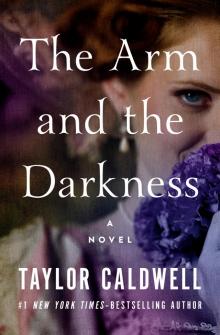 The Arm and the Darkness
The Arm and the Darkness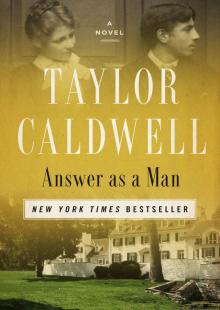 Answer as a Man
Answer as a Man Grandmother and the Priests
Grandmother and the Priests On Growing Up Tough: An Irreverent Memoir
On Growing Up Tough: An Irreverent Memoir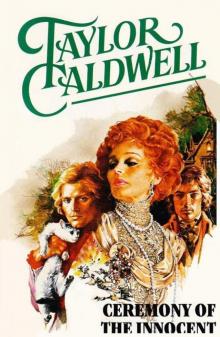 Ceremony of the Innocent
Ceremony of the Innocent The Listener
The Listener Bright Flows the River
Bright Flows the River The Earth Is the Lord's
The Earth Is the Lord's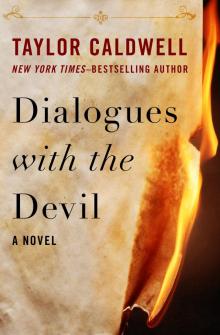 Dialogues With the Devil
Dialogues With the Devil A Tender Victory
A Tender Victory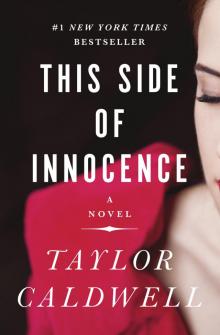 This Side of Innocence
This Side of Innocence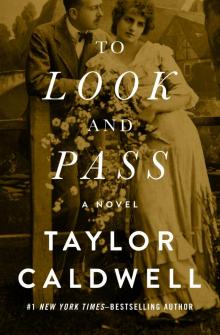 To Look and Pass
To Look and Pass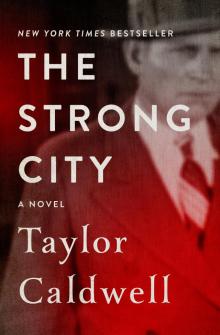 The Strong City
The Strong City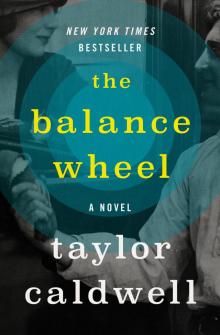 Balance Wheel
Balance Wheel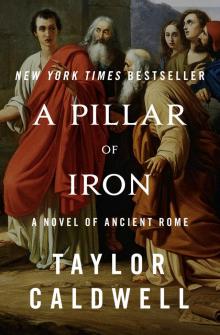 A Pillar of Iron: A Novel of Ancient Rome
A Pillar of Iron: A Novel of Ancient Rome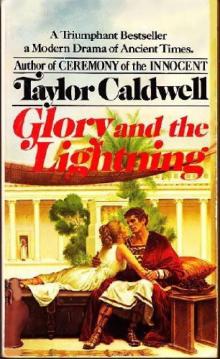 Glory and the Lightning
Glory and the Lightning Dear and Glorious Physician
Dear and Glorious Physician The Wide House
The Wide House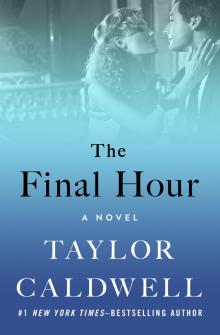 The Final Hour
The Final Hour Never Victorious, Never Defeated
Never Victorious, Never Defeated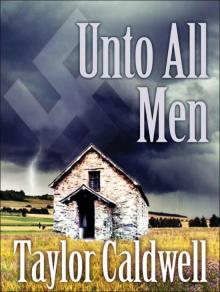 Unto All Men
Unto All Men The Turnbulls
The Turnbulls Your Sins and Mine: The Terrifying Fable of a World Without Faith
Your Sins and Mine: The Terrifying Fable of a World Without Faith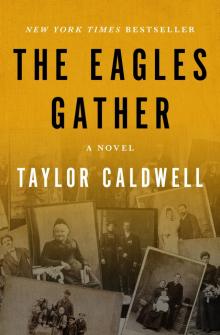 The Eagles Gather
The Eagles Gather Let Love Come Last
Let Love Come Last The Devil's Advocate: The Epic Novel of One Man's Fight to Save America From Tyranny
The Devil's Advocate: The Epic Novel of One Man's Fight to Save America From Tyranny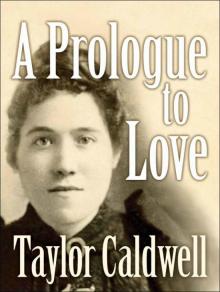 A Prologue to Love
A Prologue to Love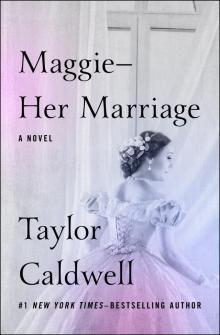 Maggie: Her Marriage
Maggie: Her Marriage The Late Clara Beame
The Late Clara Beame Melissa
Melissa Great Lion of God
Great Lion of God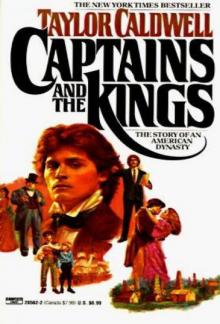 Captains and the Kings
Captains and the Kings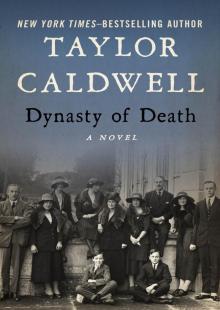 Dynasty of Death
Dynasty of Death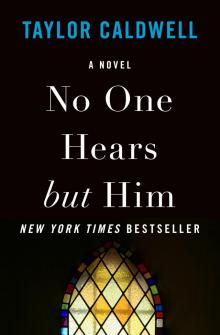 No One Hears but Him
No One Hears but Him The Sound of Thunder
The Sound of Thunder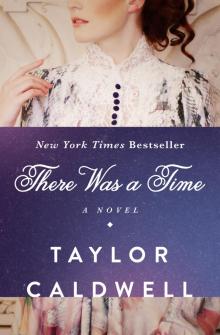 There Was a Time
There Was a Time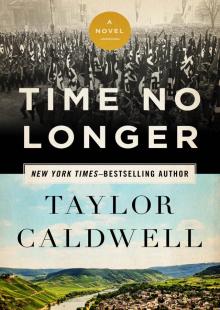 Time No Longer
Time No Longer I, Judas
I, Judas The Devil's Advocate
The Devil's Advocate The Romance of Atlantis
The Romance of Atlantis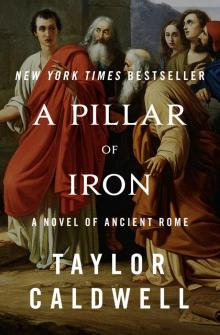 A Pillar of Iron
A Pillar of Iron On Growing Up Tough
On Growing Up Tough Your Sins and Mine
Your Sins and Mine